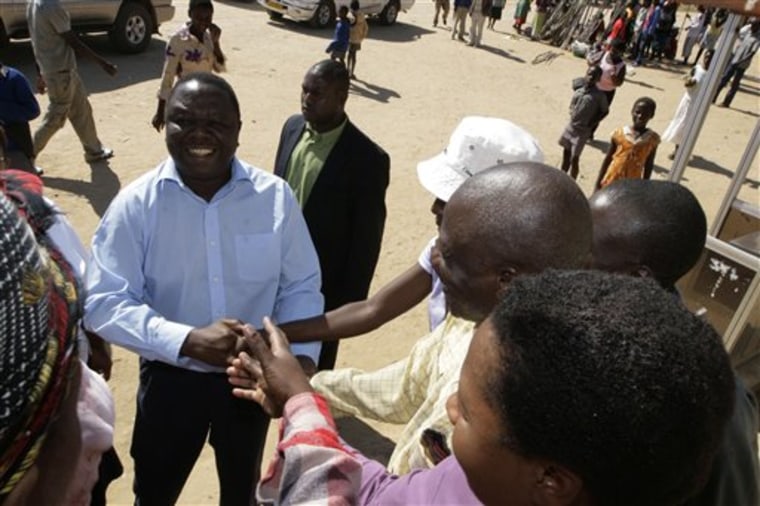The U.S. ambassador to Zimbabwe on Friday warned of possible "massive starvation" there as police again detained opposition leader Morgan Tsvangirai.
The opposition said its rallies had been banned indefinitely three weeks before the presidential runoff, while the U.S. ambassador accused President Robert Mugabe's regime of using food as a weapon to stay in power.
U.S. Ambassador James McGee said the regime is distributing food mostly to its supporters and that those backing the opposition are offered food only if they hand in identification that would allow them to vote.
If the situation continues, "massive, massive starvation" will result, McGee told reporters in Washington by video conference from Harare.
Aid groups in Zimbabwe were ordered Thursday to halt their operations, leaving impoverished Zimbabweans dependent on the government and Mugabe's party.
On Friday, Morgan Tsvangirai's Movement for Democratic Change said that police had banned the party's rallies out of concern for the safety of Tsvangirai and other party leaders. The open-ended ban only affects the opposition.
Tsvangirai spokesman George Sibotshiwe called the justification "nonsense," and said the ban was "a clear indication that the regime will do everything necessary to remain in power."
Tsvangirai beat Mugabe in the March 29 first round, but did not garner the 50 percent plus one vote necessary to avoid a runoff, which is scheduled for June 27.
Opposition and human rights groups accuse Mugabe of orchestrating violence to ensure he wins re-election amid growing unpopularity for his heavy-handed rule and the country's economic collapse.
Questioned while campaigning
Tsvangirai had been trying to campaign Friday around Bulawayo, Zimbabwe's second largest city. He was stopped at two roadblocks, and the second time was ordered to a police station about 30 miles from Bulawayo.
About two hours later, he and reporters with him were allowed to leave the station, and they drove back to Bulawayo under police escort.
Tsvangirai was questioned by police for 25 minutes at the station, and was told that all party rallies in the country had been banned indefinitely, Sibotshiwe said.
On Wednesday, Tsvangirai said he was detained for nine hours at another police station near Bulawayo. Police spokesman Wayne Bvudzijena denied police were interfering with the opposition campaign.
Bvudzijena said he was not aware of Friday's incidents, but said that it is not uncommon for police to stop drivers at roadblocks to ensure they are not transporting weapons.
"Tsvangirai and his convoy are not immune to search," he said. "They can be searched at any roadblock they pass."
He also said candidates had been told they needed to inform police before holding a political rally.
McGee also expressed concern Friday for Tsvangirai, who has survived at least three assassination attempts. In 1997, unidentified assailants tried to throw him from a 10th-floor window.
Last year, he was hospitalized after a brutal assault by police at a prayer rally. Images seen around the world of his bruised and swollen face have come to symbolize the plight of dissenters in Zimbabwe.
"Do I fear for Morgan Tsvangirai's life? Given the excesses of the government here, we are not sure what they will do," McGee said.
Tsvangirai, who lost a 2002 presidential election that independent observers said was rigged in Mugabe's favor, had only returned to Zimbabwe in late May to campaign for the runoff. He left the country soon after the March first round, and his party has said he was the target of a military assassination plot.
The Movement for Democratic Change says at least 60 of its supporters have been slain in the past two months.
On Thursday, a mob of Zimbabwe "war veterans," a group of often violent Mugabe loyalists, waylaid a convoy of American and British diplomats investigating political violence, beating a local staffer, slashing tires and threatening to burn the envoys, the U.S. Embassy said.
Mugabe frequently accuses Britain and the United States of plotting to topple him and return Zimbabwe to colonial rule.
Zimbabwe's social welfare minister, Nicholas Goche, sent aid groups in Zimbabwe a memorandum on Thursday ordering an indefinite suspension of field work.
Earlier this week, the aid organization CARE International said it had been ordered to halt operations pending an investigation of allegations it was campaigning for the opposition. CARE denies the allegation.
Millions of Zimbabweans depend on international groups for food and other aid as the country's economy crumbles. The world's highest inflation rate has put staples out of reach in what was once the region's breadbasket.
In London, British Development Aid Secretary Douglas Alexander said the decision was evidence of a callous contempt for human life.
"For Robert Mugabe to use the threat of hunger as a political weapon shows a callous contempt for human life," Alexander said. "For the sake of millions of the poorest and most vulnerable people in Zimbabwe, aid must be allowed to get through."
Mugabe has led Zimbabwe since independence from Britain in 1980 and was once hailed as a liberator who promoted racial reconciliation and economic empowerment.
But he has been accused of clinging to power through election fraud and intimidation, and of destroying his country's economy through the seizure of white-owned farms beginning in 2000.
